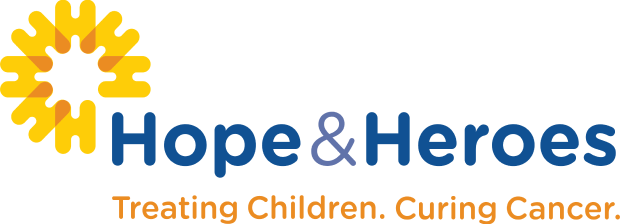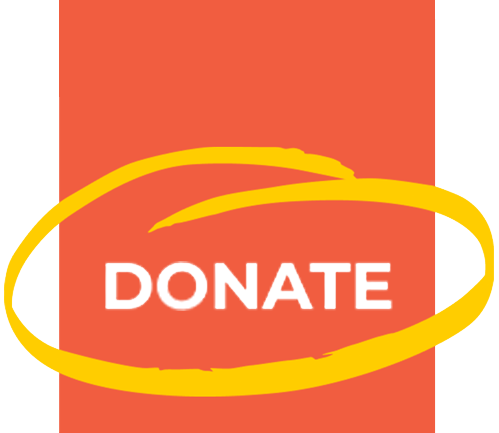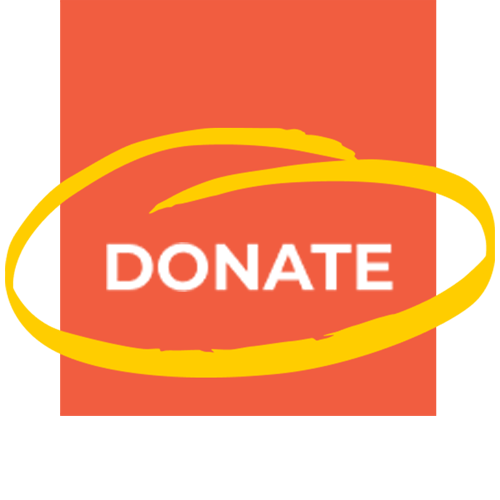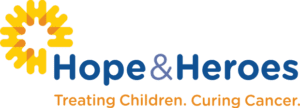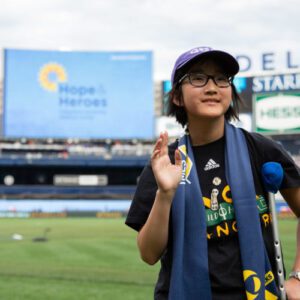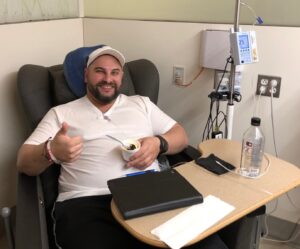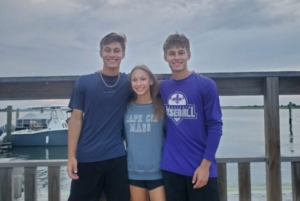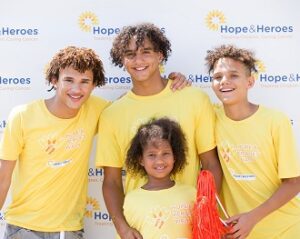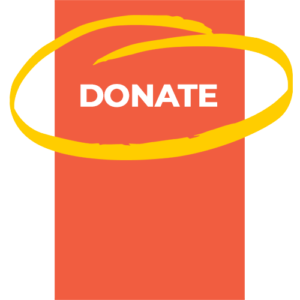As we come to the end of Childhood Cancer Awareness Month, we want to share with you a message from Alison Meletta Kucich. Ali, a writer, is the mom of three wonderful boys including Xander, who is a pediatric cancer survivor. The Kucich family is a part of the Hope & Heroes community, and we are grateful for all they do to raise funds and awareness to help kids like Xander. Continue reading to see what Ali has to say about Childhood Cancer Awareness Month, pediatric cancer, and what we all can do to help:
Ali & Xander on a routine hospital visit
Today marks the end of Childhood Cancer Awareness Month. I’m sure you’ve noticed it on Facebook, people “Going Gold” to raise awareness of pediatric cancer. If you’re like I was seven years ago, your awareness includes a clenched stomach whenever a St. Jude commercial airs on television, and somewhat shameful relief when the month ends, because sick, bald children are gut-wrenchingly hard to see.
Two weeks ago, I discovered a cache of photos on an old iPad. In these pictures, Xander and I sit together in a hospital bed in the emergency room on New Year’s Eve 2009. His brown eyes are puffy from exhaustion, and I stare hollowly, one week postpartum with my second child and downright humorless. In general, pictures of Xander during treatment are hard for me to see. They have the ability to transport me through the ether to that exact moment in time, reopening trauma wounds that refuse to heal. But these pictures are more than that, and I have been unable to stop thinking about what they represent. These ugly, candid ER shots are photos of blissful unawareness suspended in time, our “before” pictures. These photos capture our last moments as regular people, untouched by the monster that is childhood cancer.

An hour after these pictures were taken, we were called into a private room and I refused to sit, as though that act of rebellion could change anything about what we were going to hear. A doctor whose name I will never forget told us that our son – our two year-old – had liver cancer. A tumor the size of a softball overtaking his tiny baby liver. We stood there in a cheerfully painted room under the bright fluorescent lights and trembled, as the rest of the world fell away and we crossed over into the absurdity of Cancerland. Our language does not possess adequate vocabulary to describe what it feels like to hear that your child has a devastating and potentially terminal illness. There are no words to describe the inhumane way it feels to watch your child suffer through treatment.
Despite the fact that I am a cancer survivor’s parent, this month of Awareness troubles me. I’ve never liked Childhood Cancer Awareness Month, or the fact that everything has a “month.” Worry about kids’ cancer one month, worry about prostate cancer another, worry about autism the next, and so on, like a checklist. I’ve long felt that, if anything, these months should be called “Action” months, not “Awareness” months. I believe that calling people to action might yield greater benefits than just suggesting that we be aware. While I appreciate the outpouring of public and social media support for cancer families, I believe that awareness alone does little to raise the funds necessary to fight this disease. Money combats this disease, whether it’s funding dedicated to research, or funding used to support cancer families so they can care for their sick child. I was fortunate to be a stay-at-home mom when Xander was diagnosed. I can’t imagine I would have been able to keep any job while caring full-time for an extremely ill child.
Every year since Xander’s treatment, we have raised funds for Hope & Heroes, the foundation that supports the pediatric oncology program at Columbia University Medical Center, where Xander was treated. I am more than vocal about the fact that approximately 42 children per day are diagnosed with cancer. Imagine walking into your child’s school and seeing two empty classrooms per day, because that’s a very clear picture of the number of kids afflicted in our country each day. Cancer is an insidious, merciless, opportunistic beast. It doesn’t spare children just because they haven’t yet learned to ride a bike or read a book or been able to go to the prom. At present, one in four children diagnosed with cancer does not survive.

The National Cancer Institute (NCI) dedicates approximately 4% of its annual budget to pediatric cancer. That amount is trivial and the allocation has not changed in a decade. At first glance, this number makes the scientific community seem completely sinister, but a long list of reasons influence this paltry number. For one, pediatric cancers are still considered rare cancers. Xander’s specific type of liver cancer, Hepatoblastoma, affects four or five kids a year in the U.S. As much as we wish the pharmaceutical industry would stop at nothing to find cures for our kids, businesses don’t operate like that. Manufacturers need to generate profits, and not many will come from a drug designed to treat a condition so specific. Another reason is that it’s challenging to run clinical drug trials on children, to find enough children afflicted with the same disease to form a trial group, or to find parents who will agree to clinical trials until everything else has failed. (As a result, many kids are treated with “medicines” designed for adult treatment, including Xander.) Despite this scientifically justifiable information, it still seems emotionally unjustifiable. Pediatric cancer claims more lives than all other childhood illnesses combined, and we need funding in order to develop better forms of treatment.
So what can we all do with this awareness? How can we take action? What can we, as individuals, do to fight this beast? While there are many options, I’d like to offer a few suggestions.
- From a macro perspective, we can use the knowledge that there is insufficient funding for research, and donate to charitable nonprofits that work to develop treatments for sick children or assist their families. Or both. If you are a person who donates discretionary income to charities, then pediatric cancer foundations need your support! Hope & Heroes is one of these organizations that dedicates funds to novel research protocols, which treat children whose traditional protocols are inapplicable or have failed. Columbia University Medical Center is a public hospital, which means the Division of Pediatric Hematology, Oncology and Stem Cell Transplantation turns no child away because of a family’s inability to pay. Among other functions, Hope & Heroes also assists with the gap in funding. On a personal note, their support during Xander’s treatment helped us get through the day.
- Another option is to support an organization that provides assistance to cancer families, or to help a local family in need- unfortunately, every community has them. Hope & Heroes is able to provide financial assistance to families with greatest needs, but it’s not always financial. Being the caretaker of a cancer patient is emotionally and physically exhausting. I have met parents who spend all day in the hospital with a sick child, only to return home and do laundry, help with homework, make meals and try to be present for their other kids. Some families are forced to split in half, with one parent relocating near the hospital and the other manning the ship at home. Some parents lose their jobs because they miss too many days, or have to sell their homes because they need to pay for treatment. There are ways, as a friend or an anonymous community member, to ease a family’s burden just a small fraction at a time.
- On the home front, you can be aware of your own children’s or family member’s health, and be proactive about your own. Advocate for your children if something about their health or well-being seems “off.” Xander’s story is somewhat sensational, and it doesn’t usually happen that way. When he was diagnosed, he had no symptoms. I discovered a lump, we acted on it, and he was diagnosed within the day. Most symptoms of pediatric cancer mimic other childhood illnesses or viruses, which usually means a delay in diagnosis and sometimes, a worse prognosis. The symptoms vary, but include fever, body aches, vomiting, digestive issues, bloody noses, headaches, and coordination problems. I do not suggest you become an alarmist, but I do suggest you remain aware of any unusual changes in your child’s health – or your own – and act appropriately. On that note, kids need their families. Many childhood cancers are not preventable, but a lot of adult cancers are. Get yourself to your screenings and checkups.
- You can use your awareness of pediatric cancer to practice empathy. Challenge yourself to treat people with illness or special needs the way you would want to be treated in that circumstance. When Xander was in treatment, he couldn’t risk infection by being around other children or going into public places. When he was well enough, we took a walk around lower Manhattan with his baby brother in the double stroller every day. Even with a hat on, his illness was obvious. He had a feeding tube taped to his nose, which was attached to a food pump in a bag that dangled from the stroller. As we walked, almost everyone looked away. Very rarely did someone look me in the eye, and when someone did, it was with pity. We were so frightening to behold that we became invisible. It is a sad day when you realize that the only place where you fit in is the oncology center. Our condition was apparent, it’s not always so obvious. You can use your awareness to try not to judge.
- Show up for people who need you, in whatever capacity they need, despite the fact that it frightens you. Most cancer families will not ask your for help, nor will they respond to the suggestion that they contact you if they need something. Call or text or email, even if you don’t know that to say. Don’t expect a response, immense gratitude or some outpouring of extremely personal details. Many cancer families are on autopilot, just getting through the day. Just show up. It may not seem that way, but it makes a difference.
Finally, take a moment of awareness each day to count your blessings and reflect on your gratitude. Life is short. Every day, we are bombarded with media images showing us that life can change in an instant. For some reason, it doesn’t really sink in until it happens to you. Each night, I snuggle my kids before bed. Not one night passes where I don’t remember what it was like to hold Xander during treatment and pray it wasn’t the last.
Join the Kucich family in supporting Hope & Heroes by clicking here
